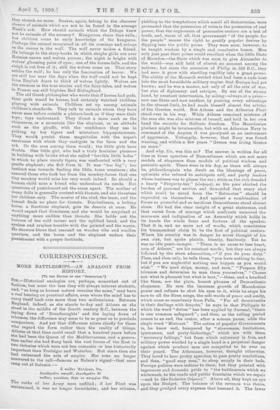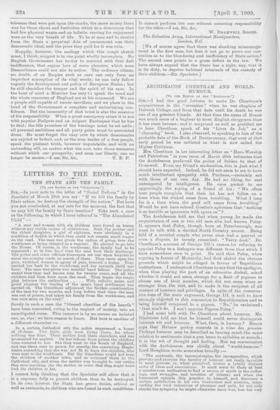CORRESPONDENCE.
MORE BATTLESHIPS.—AN ANALOGY FROM HISTORY.
rro TES EDITOR OR TIM "SPECTATOR:1
Sin,—Historical analogies are, perhaps, somewhat out of fashion, but none the less they will always interest students, and, "so long as human nature remains the same," may have a real bearing on practical affairs, even where the mind has to Carry itself back over more than two millenniums. Between
• England, indeed, as she stands to-day and Athens as she stood in the middle of the fourth century B.C., between the laying down of Dreadnoughts' and the laying down of triremes, the difference may seem to be so great as to preclude comparison. And yet that difference exists chiefly for those 'who regard tbe form rather than the reality of things. Athens at that time could recall that a hundred years before she had been the Queen of the Mediterranean, and a genera- tion earlier she had flung back the vast forces of the East in two victories which were not less romantic or less historically important than Trafalgar and Waterloo. But since then she had unlearned the arts of empire. Her sons no longer answered to the call—famous as Nelson's signal—that once rang out at Salamis :— waaes 'EA.hvcov, Pre, ihevOepoil•re irterpbr, iNeufhpoirre yuvalocas, &Co, is raT4on, an.
The ranks of her Army were unfilled ; if her Fleet was maintained, it was no longer formidable; and her citizens,
yielding to the temptations which assail all democracies, were persuaded that the possession of votes is the possession of real power, that the argument; of persuasive orators are a test of truth, and, worst of all, that government "of the people for the people" means the right to gratify popular desires by dipping into the public purse. They were soon, however, to be taught wisdom by a single and conclusive lesson. Men only just pest their prime could recollect when the little State of Macedon—the State which was soon to give Alexander to the world—was still held of almost no account among the nations; but since the accession of Philip in 359 B.C., they bad seen it grow with startling rapidity into a great power. The ability of the Monarch welded what had been a rude host into the most formidable military engine that Europe had yet known; and lie was a master, not only of all the arts of war, but also of diplomacy and intrigue. By use of the strong hand, by constant intervention, by aiding—always at a price— now one State and now another, by pushing every advantage to the utmost limit, he had made himself almost the arbiter of the Grecian world. But Athens and the Athenian Fleet stood ever in his way. While Athens remained mistress a the seas she was also mistress of herself, and held in her own hand the security for Hellenic freedom. The Macedonian phalanx might be invulnerable, but with an Athenian Navy in command of the Aegean it waa paralysed as an instrument of aggression. Unhappily, however, that Navy was found wanting, and within a few years "Greece was living Greece no more."
And why. Sir, was this so ? Time answer is written for all time in those speeches of Demosthenes which are not more models of eloquence than models of political wisdom and patriotic spirit. There were in his day, as there will always be, philanthropists who dwelt on the blessings of peace, optimists who refused to anticipate evil, and party leaders whose business was to please the ear; while as the rich dreaded a heavy "Property-tax" (eicrsbopri), so the poor shirked the burden of personal service, and demanded that every obol which could be saved from the " Estimates " should be expended on themselves. And against a combination of forces so powerful and so insidious Demosthenes stood almost alone. He had the clear insight of a great statesman, Find that rarest form of courage which confronts unmoved the murmurs and indignation of an Assembly which holds in its bands the whole fame and fortune of the speaker. That it is, and no mere arb of words, which constitutes his transcendent claim to be the first of political orators. Where his country was in danger he never thought of his own risk, but spoke plainly, bluntly, fearlessly. Yet he was no idle panic-monger. "There is no cause to lose heart, men of Athens," are his constant words ; but they are always followed by the stern admonition,—" if you do your duty." Then, and then only, be tells them, "you have nothing to fear, but if you are neglectful nothing can happen as you would wish." "We need ships, money, and men," "Prepare fifty triremes and determine to man them yourselves," "Choose not what is pleasant but what is beat,"—these, and a hundred like them, are the plain, honest phrases of Demostbenio eloquence. He sees the immense growth of Macedonian power and refuses to shut his eyes to it, while be stops his ears to all the Siren songs, the soft words of peace and amity, which came so ceaselessly from Pella. "For all democracies in their dealings with despots," he says in that Philippic to which the word "divine" has been applied by Juvenal, "there is one common safeguard"; and then, as the rolling period comes to an end, the orator, after a solemn pause, adds the single word "Mistrust." The action of popular Governments is, he knew well, hampered by " slownesses, hesitations, ignorances, and party-bickerings," which are with them "necessary failings," but from which autocracy is free, and military power wielded by a single hand is a perpetual danger against which prudent men are compelled to be ever on their guard. The Athenians, however, thought otherwise. They loved to hear pretty speeches, to pass pretty resolutions, and then, "good easy men," to sleep snugly in their beds. Foreign politics were tedious to them, but they pointed with ingenuous and domestic: pride to "time battlements which we whitewash, to the roads and public fountains which we repair —and to like fooleries (Xipovr)." Above all, they kept an eye upon the Budget. The balance of the revenue Was theirs, ad they grudged every expense that lessened it. The fewer
triremes that were put upon the stocks, the more money there was for those shows and festivities which to a democracy that had few physical wants and an infinite craving for enjoyment were as the very breath of life. To be at ease and to receive from the State a perpetual dole of amusement was their democratic ideal, and the price they paid for it was ruin.
Happily, however, the analogy which this rough sketch must, I think, suggest is in one point wholly incomplete. No English Government has to-day to contend with that dull indifference, that supine love of mere pleasure, which even Demosthenes could not stir to action. The ordinary citizen, no doubt, of an Empire such as ours can only form an imperfect conception of its vital needs; be can only follow vaguely the development and policy of European States ; but be still cherishes the temper and the spirit of his race. In the hour of need a Minister has only t speak the word and the whole resources of England are at his command. We are a people still capable of heroic sacrifices, and we place in the bead of the Government a complete and unhesitating con- fidence. But the immensity of that trust is also the measure of his responsibility. When a great emergency arises it is not with popular Budgets and an exigent Exchequer that be has to deal; the idle promises of the hustings must be set aside ; all personal ambitions and all party gains must be accounted dross. He must forget the easy arts by which democracies are cajoled or bribed, and, as the true leader of a free people, • speak the plainest truth, however unpalatable, and with an unbending will, no matter what the cost, take those measures without will& our prosperity, and even our liberty, can no
longer be secure.—I am, Sir, 8te., T. E. P.











































 Previous page
Previous page